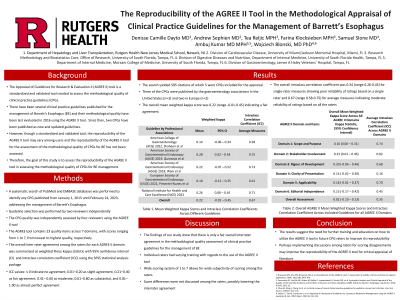Sunday Poster Session
Category: Esophagus
P0500 - The Reproducibility of the AGREE II Tool in the Methodological Appraisal of Clinical Practice Guidelines for the Management of Barrett’s Esophagus
Sunday, October 27, 2024
3:30 PM - 7:00 PM ET
Location: Exhibit Hall E

Has Audio

Denisse Camille Dayto, MD
Rutgers New Jersey Medical School
Presenting Author(s)
Denisse Camille Dayto, MD1, Andrew Sephien, MD2, Tea Reljic, MPH3, Farina Klocksieben, MPH3, Samuel Slone, MD3, Ambuj Kumar, MD, MPH3, Wojciech Blonski, MD, PhD4
1Rutgers New Jersey Medical School, Inverness, FL; 2University of Alabama at Birmingham Hospital, Birmingham, AL; 3University of South Florida Morsani College of Medicine, Tampa, FL; 4University of South Florida, James A. Haley VA Hospital, Tampa, FL
Introduction: There have been several clinical practice guidelines (CPG) published for the management of Barrett’s Esophagus (BE) and their methodological quality have been last evaluated in 2016 using the validated Appraisal of Guidelines for Research & Evaluation II (AGREE II) tool. Since then, two CPGs have been published as new and updated guidelines. However, the reproducibility of the AGREE II tool for the assessment of the methodological quality of CPGs for BE has not been assessed. Therefore, the goal of this study is to assess the reproducibility of the AGREE II tool in assessing the methodological quality of CPGs for BE management.
Methods: A systematic search of PubMed and EMBASE databases was performed to identify any CPG published from January 1, 2015 until February 10, 2023, addressing the management of Barrett’s Esophagus. Guideline selection was performed by two reviewers independently. The CPG quality was independently assessed by four reviewers using the AGREE II tool. The AGREE tool contains 23 quality items across 7 domains. The reproducibility was summarized as weighted Fleiss kappa statistic and intraclass correlation coefficient using the SPSS statistical analysis package.
Results: The search yielded 585 citations of which 5 were CPGs included for the critical appraisal. Three of the CPGs were published by the gastroenterology associations in the United States (n=3) and two in Europe (n=2). The overall mean weighted kappa score for was 0.220 (range -0.009-0.449) indicating a fair agreement. The overall intraclass correlation coefficient was 0.341 (range 0.259-0.427) for single-rater measures showing poor reliability of ratings based on a single rater and 0.674 (range 0.583-0.749) for average measures indicating moderate reliability of ratings based on all the raters.
Discussion: The findings of our study show that there is only a fair overall interrater agreement in the methodological quality assessment of clinical practice guidelines for the management of BE. The results suggest the need for further training and education on how to utilize the AGREE II tool in future CPG raters to improve its reproducibility.
Note: The table for this abstract can be viewed in the ePoster Gallery section of the ACG 2024 ePoster Site or in The American Journal of Gastroenterology's abstract supplement issue, both of which will be available starting October 27, 2024.
Disclosures:
Denisse Camille Dayto, MD1, Andrew Sephien, MD2, Tea Reljic, MPH3, Farina Klocksieben, MPH3, Samuel Slone, MD3, Ambuj Kumar, MD, MPH3, Wojciech Blonski, MD, PhD4. P0500 - The Reproducibility of the AGREE II Tool in the Methodological Appraisal of Clinical Practice Guidelines for the Management of Barrett’s Esophagus, ACG 2024 Annual Scientific Meeting Abstracts. Philadelphia, PA: American College of Gastroenterology.
1Rutgers New Jersey Medical School, Inverness, FL; 2University of Alabama at Birmingham Hospital, Birmingham, AL; 3University of South Florida Morsani College of Medicine, Tampa, FL; 4University of South Florida, James A. Haley VA Hospital, Tampa, FL
Introduction: There have been several clinical practice guidelines (CPG) published for the management of Barrett’s Esophagus (BE) and their methodological quality have been last evaluated in 2016 using the validated Appraisal of Guidelines for Research & Evaluation II (AGREE II) tool. Since then, two CPGs have been published as new and updated guidelines. However, the reproducibility of the AGREE II tool for the assessment of the methodological quality of CPGs for BE has not been assessed. Therefore, the goal of this study is to assess the reproducibility of the AGREE II tool in assessing the methodological quality of CPGs for BE management.
Methods: A systematic search of PubMed and EMBASE databases was performed to identify any CPG published from January 1, 2015 until February 10, 2023, addressing the management of Barrett’s Esophagus. Guideline selection was performed by two reviewers independently. The CPG quality was independently assessed by four reviewers using the AGREE II tool. The AGREE tool contains 23 quality items across 7 domains. The reproducibility was summarized as weighted Fleiss kappa statistic and intraclass correlation coefficient using the SPSS statistical analysis package.
Results: The search yielded 585 citations of which 5 were CPGs included for the critical appraisal. Three of the CPGs were published by the gastroenterology associations in the United States (n=3) and two in Europe (n=2). The overall mean weighted kappa score for was 0.220 (range -0.009-0.449) indicating a fair agreement. The overall intraclass correlation coefficient was 0.341 (range 0.259-0.427) for single-rater measures showing poor reliability of ratings based on a single rater and 0.674 (range 0.583-0.749) for average measures indicating moderate reliability of ratings based on all the raters.
Discussion: The findings of our study show that there is only a fair overall interrater agreement in the methodological quality assessment of clinical practice guidelines for the management of BE. The results suggest the need for further training and education on how to utilize the AGREE II tool in future CPG raters to improve its reproducibility.
Note: The table for this abstract can be viewed in the ePoster Gallery section of the ACG 2024 ePoster Site or in The American Journal of Gastroenterology's abstract supplement issue, both of which will be available starting October 27, 2024.
Disclosures:
Denisse Camille Dayto indicated no relevant financial relationships.
Andrew Sephien indicated no relevant financial relationships.
Tea Reljic indicated no relevant financial relationships.
Farina Klocksieben indicated no relevant financial relationships.
Samuel Slone indicated no relevant financial relationships.
Ambuj Kumar indicated no relevant financial relationships.
Wojciech Blonski indicated no relevant financial relationships.
Denisse Camille Dayto, MD1, Andrew Sephien, MD2, Tea Reljic, MPH3, Farina Klocksieben, MPH3, Samuel Slone, MD3, Ambuj Kumar, MD, MPH3, Wojciech Blonski, MD, PhD4. P0500 - The Reproducibility of the AGREE II Tool in the Methodological Appraisal of Clinical Practice Guidelines for the Management of Barrett’s Esophagus, ACG 2024 Annual Scientific Meeting Abstracts. Philadelphia, PA: American College of Gastroenterology.
